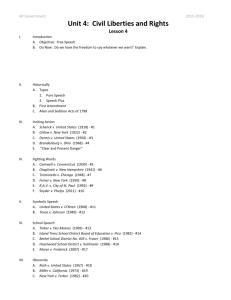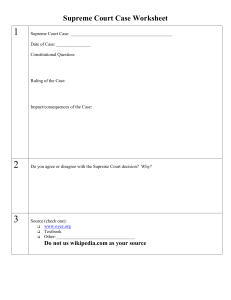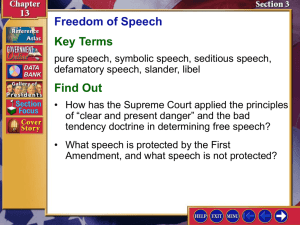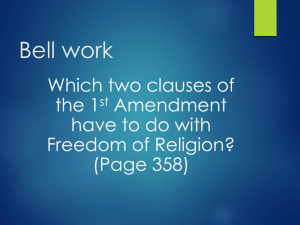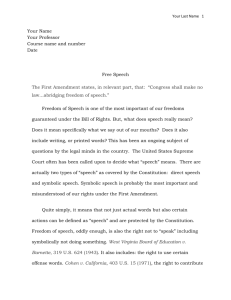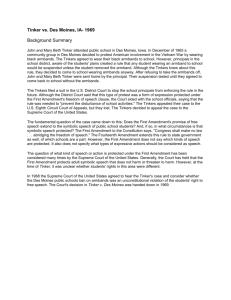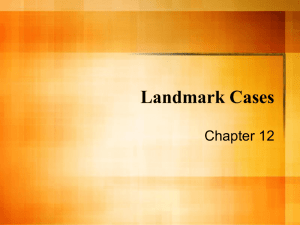Freedom of Speech - Thomas County Schools
advertisement
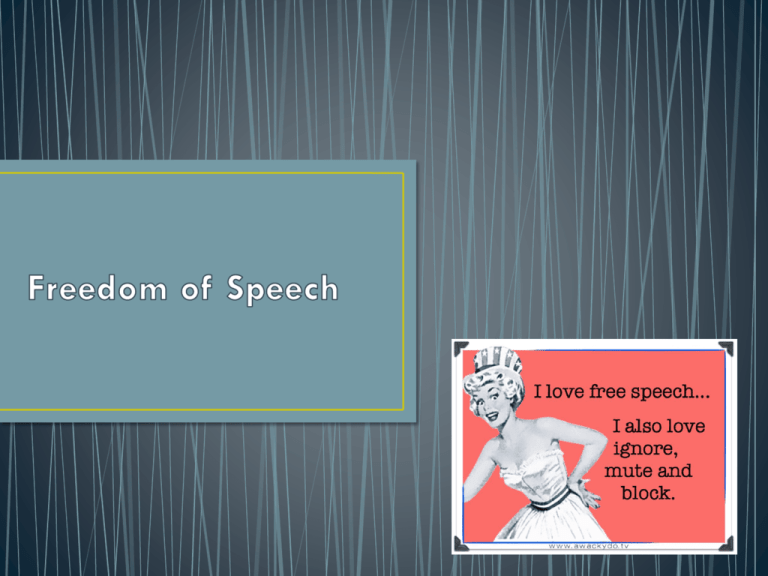
“Congress shall make no law respecting an establishment of religion, or prohibiting the free exercise thereof; or abridging the freedom of speech, or of the press; or the right of the people to peaceably assemble, and to petition the government for a redress of grievances” First Amendment Freedoms: Freedom of Speech Freedom of Religion Freedom of the Press Freedom of Assembly Right to Petition • The Supreme Court makes rulings on the meaning • The Supreme Court balances the rights of the individual with the needs of society Individual?? Society?? • The first amendment guarantees Americans the freedom of speech. Does that mean that you can say what you want, when you want, where you want? Freedom of Speech There are 3 types of speech: 1. Symbolic 2. Speech Plus Action 3. Pure Speech Freedom of Speech Symbolic Speech: action that is meant to convey a message. Freedom of Speech Speech Plus Action: when you say AND do something at the same time to convey a message. Freedom of Speech Pure Speech: written and spoken words that are protected by the First Amendment, unless those words create a “clear and present danger” to society or if they constitute libel, slander, or obscenity • something that someone WRITES about you that harms your reputation. • Lindsay Lohan is suing rapper Pitbull over a rap lyric, "locked up like Lindsay Lohan." According to the lawsuit: "By virtue of [the song's] wide appeal, condemnation, excoriation, disparaging or defamatory statements by the defendants about [Lohan] are destined to do irreparable harm." • something that someone SAYS about you that harms your reputation. • When blood was found in the tub at the Intercontinental Hotel in London , a housekeeper claimed Lady Gaga bathed in blood as a part of a Satanic ritual. • Concerning slander between John Adams and Thomas Jefferson, Adams’ organization called Jefferson "a mean-spirited, low-lived fellow, the son of a half-breed Indian squaw, sired by a Virginia mulatto father." They also called him an atheist, a weakling, a coward and a libertine. • Speech that causes a rebellion or Civil Unrest • Bradenburg v. Ohio • The Brandenburg v. Ohio U.S. Supreme Court decision maintains that seditious speech—including speech that constitutes an incitement to violence—is protected by the First Amendment to the United States Constitution as long as it does not indicate an “imminent” threat. • Facts: Students at a high school in Iowa decided to wear black armbands to school. The armbands represented their protest of the Vietnam War. They were suspended and parents filed suit against the school board. The case tied and went to the Supreme Court. • Type of speech used? Symbolic • Who won? Students won • Why? First Amendment rights are protected on school grounds as long as actions do not interfere with the school day. • Facts: Gregory Lee Johnson burned a flag in front of Dallas City Hall in protest of the Reagan administration. He was arrested and sentenced to one year in jail. • Type of speech used? Symbolic • Who won? Johnson won • Why? The action was protected expression under the First Amendment. Speech can’t be limited because society finds the idea itself offensive. • Facts: David O’Brien burned his draft card at a Boston courthouse. He was convicted under a federal law for the destruction of draft cards. • Type of speech used? Symbolic • Who won? United States won • Why? This was not an infringement on O’Brien’s freedom of speech. Facts: Matthew Fraser made a speech that included inappropriate or obscene remarks. He was suspended . Type of speech used? Pure speech Who won? School District Why? It was appropriate to prohibit the use of vulgar and offensive language Facts: The family of Snyder accused Phelps and his congregation of defamation, invasion of privacy, and inflicting emotional distress because they demonstrated at Snyder’s funeral. Type of speech used? Pure Speech Who won? Phelps Why? First Amendment protected Phelps rights to protest
